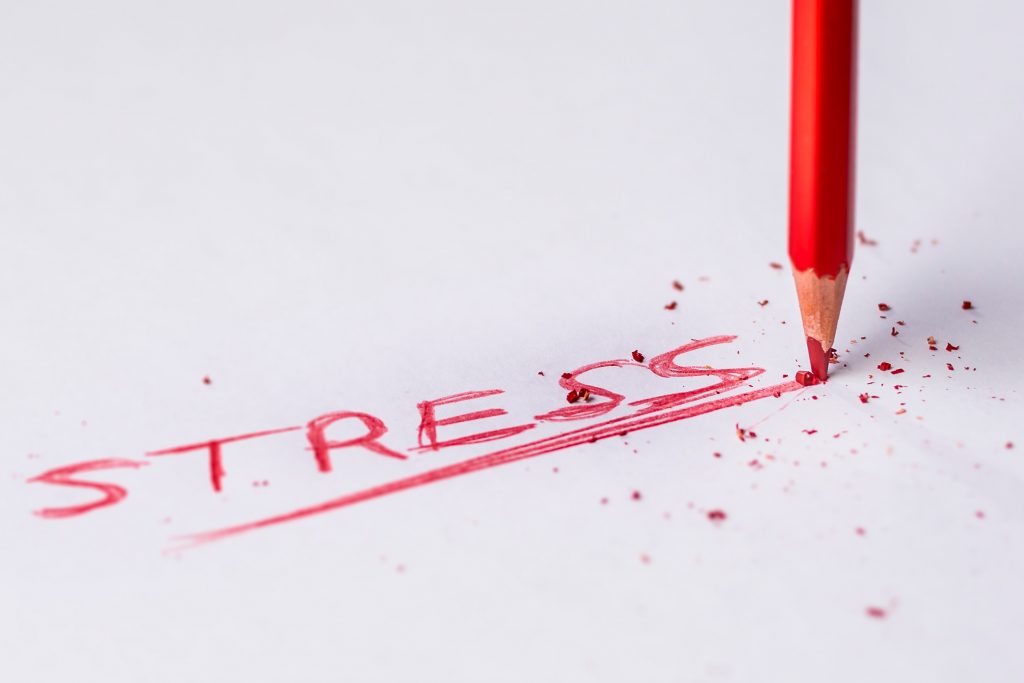In this blog post, I wanted to talk about stress because I honestly believe it is a root cause of all dysfunctions in the body that eventually leads to disease.
Stress comes in many forms ’mental (what we are mentally challenging ourselves with), emotional (how we feel about things, trauma, death), physical (if we have injured, strained ourselves, or had an operation), and biochemical ( something internal to our body that is off balance like dysbiosis, inflammation, food sensitivities).
I would like to dive deeper into what stress is and help everyone understand the components of it and how the body functions with it. Bear with me as I go through some technical explanations in the simplest form and I promise, by the end of reading this newsletter you will be able to understand the essence of stress and why we need to keep it at bay.

Stress is essential for our survival. It primes our immune system and keeps things in balance. When faced with danger, we experience a built-in fight or flight response. This nervous system is connected with every part of our physical body.
It has two systems known as Voluntary (VNS ) and Autonomic Nervous System (ANS).
The voluntary is part of the peripheral Nervous System (PNS), it connects the brain to the motor neurons that control our muscles, glands, and sensory neurons. Motor neurons are the nerve cells within the nervous system and are responsible for converting external stimuli from the individual’s environment into internal electric impulses that handle all the body movements. For example: if we touch something hot, we have an immediate reaction of pulling our hand away to protect it and prevent it from burning – This is voluntary.
Autonomic Nervous System (ANS) is involuntary, and we have no conscious control over it. The body has a built-in system that acts on signals from within the body like our heart beating and our lungs breathing even while asleep.
The hypothalamus (H), pituitary (P) and Adrenals (A) are responsible for your stress response. H and P are located at the base of the brain and the Adrenal glands (A) are the tiny triangles over your kidneys. Once activated this HPA axis instantly gets put on alert and primes the body to either flee the situation or defend against it.
The Autonomic Nervous System has two branches: sympathetic also known as the (fight or flight) and parasympathetic Nervous System. (Rest and digest). The body needs both to function well. We need to be able to run for our lives in times of danger and we need to also sit back and relax to have better digestion and reproduction. This is where many of you always hear me say we always want to be in the Parasympathetic Nervous System Mode because we need to slow things down to function optimally.
For example, We should never rush through our meal because the body picks up on this and thinks we are under stress, so it moves away from digestion and focuses on priming our senses, getting them ready for fight or flight. The food we gobbled down does not get digested properly, we may get aches and pains in the tummy area and the body does not absorb the nutrients properly. Over time this can cause problems.
Many young couples these days are unable to conceive and are having issues, the root cause of their issue is STRESS accompanied by other factors. When the body perceives it is under stress, the last thing it wants to do is to reproduce. Think about it – when you are stressed do you feel like having sex? No, it is the last thing on your mind. The only thing your body is thinking of is survival (fight or flight) and it will shut other things down to prioritize survival.
So How does the body react to this stressful event? The Hypothalamus triggers nerve cells to release a hormone called Norepinephrine, which is a naturally occurring chemical in the body that acts as both a stress hormone and a neurotransmitter and the Adrenals will release Epinephrine better known as Adrenaline which will shorten your breath to increase oxygen uptake, dilate your pupils to be able to see things better, increase your heart rate and tighten your muscles. Your senses become sharpened all-in anticipation of fleeing for your life.
The Adrenals will also release a hormone known as Cortisol which helps the body respond to stress, fight infections, regulate blood pressure and sugar metabolism, and affects multiple organs and tissues.
Once this threat is over, the body returns to normal – heart rate slows down, breath is calm and relaxed, our digestive system is stimulated once again releasing the appropriate digestive enzymes and we begin to digest and absorb our food properly. Our hormones are balanced, and reproduction is functioning optimally. However, when the body is exposed to long-term chronic stress. This negatively impacts the body. The HPA axis becomes dysfunctional and is no longer able to switch off, like someone pressing the gas pedal and not able to remove their leg from it -supplying a steady stream of gas (cortisol) which now takes on a negative role and begins to break down the body.
The body will respond with signs of exhaustion stemming from the Adrenals.
Increased blood pressure and elevated blood sugar
Weight gain around the middle section of torso
Digestive issues – constipation and bloating
Waking up between 1- 4 am
Premature grey hair
Increased oxidative stress and free radicle production from elevated stress
Feeling tired/wired and exhausted and not sleeping throughout the night
Waking up in the morning feeling unrested after 8 hours of sleep
Reaching out for coffee as a stimulus to help with attention and focus
Please remember that as long as we can keep the switch on and off and return to normality we are coping. It is the underlying signs that we are unaware of that we do not look for and take for granted that I would like to bring your attention to because STRESS is at the root of these issues.
High levels of stress have a hand in many diseases, leaving the individuals vulnerable to more serious conditions to follow. I hope you will be able to see the connection in a few examples below.
Cardiovascular Disease:
Research has shown that high cortisol can increase blood pressure by depleting Magnesium indirectly which is very important for muscle contractions. With the heart being the largest muscle in the body, it has to pump harder, increasing blood pressure.
Cortisol increases blood sugar hence the following increase: triglycerides and cholesterol, which are factors of hypertension, stroke and heart attack. High cortisol increases Blood sugar which also increases Fasting insulin. When Blood sugar goes up the body quickly tries to get rid of it by converting it into glycogen, to have it handy in case it needs to convert it quickly for a spurt of energy (a fight or flight response) and triglycerides for later usage. Anything extra that the body can’t handle will be converted into fat as a protection mechanism to prevent sugar from roaming around the body and causing oxidative damage to the cells, especially the endothelial lining, which will cause inflammation in the arteries causing oxidative stress – inflammation, etc. vicious circle. The more sugar roams, the more the liver needs to produce insulin to get the sugar into the cell as a protection mechanism and if this system keeps working overtime and does not rest then it will lead to insulin resistance. This will have a knock-on effect on the health of the thyroid. It can limit the cellular uptake action of converting the inactive thyroid hormone T4 into the active thyroid hormone T3 resulting in sluggish metabolism and hence more weight gain resulting in low energy- a vicious cycle. All of those are the symptoms of metabolic syndrome which has its root in STRESS.
Work on reducing stress (mental, emotional, physical and biochemical). Even if you have one of the stressors out of balance, this can cause havoc on your body and lead to high cortisol. Finding the trigger and working on reducing it along with eating a healthy diet and maintaining an active lifestyle, you should be able to turn your health around.
The gastrointestinal system:
Can be affected by either delaying emptying of the digestive tract or by speeding up the amount of time it takes for food and waste to pass through the colon. As result, you can experience heartburn, indigestion, nausea and vomiting, diarrhea, constipation, dysbiosis and/or belly pain.
IBS, colitis and many other inflammatory bowel diseases are linked to inflammation of the gastrointestinal tract due to chronic stress.
To solve this issue, we need to make sure that the immune system (Sig A) in charge of all the mucosal layers in the gut, stomach, mouth, and sinus is optimally restored to stop this immune response attack on pathogens and toxins that are entering and attacking the lining due to stress and impacting the gut environment or else a vicious revolving door will keep it going. Also, keep an eye on over-the-counter medications and drugs because these also impact the health of the gut lining. We do this by lowering stress, feeding the good microbes, healing the gut lining with pre and probiotics and working on the diet by removing any inflammatory foods and providing a lot of mucilaginous herbs to heal and soothe the gut lining.
Depression:
The root cause is stress, impacting the gut through lowering stomach acid hence allowing for pathogens to take up space which leads to dysbiosis and gut lining integrity to be affected. These pathogens wreak havoc on the gut lining and impact Digestion and absorption of certain key minerals, vitamins, and amino acids. 90% of Neurotransmitters are found in the gut and not the brain especially serotonin which will be drastically affected due to the dysbiosis and maldigestion of key amino acids tryptophan and the B vitamins leading to depression.
The question is what caused the imbalance?
The long-standing dysbiosis due to stress accumulated over the years.
The stress impacts the gut integrity and affects nutrient absorption.
The low stomach acid, due to stress, is not strong enough to break down amino acids, vitamins, and minerals from the food one eats!
Maybe the many courses of antibiotics and over-the-counter medication like Advil that we pop like crazy to treat a headache or flu that impacts our gut lining hence poor absorption and digestion.
Who came first, the chicken or the egg – the stress causing the problems or the problems leading to increased stress which resulted in a cascade of things? All the pathways leading to destruction but each one’s upstream effect was STRESS.
Other scenarios that stress can also impact:
Stress can aggravate pre-existing medical conditions, especially in people suffering from diabetes because it inhibits insulin production as mentioned above.
Stress can increase levels of cortisol, which over time impacts the immune system causing it to be weakened, and not able to do its job of fighting viruses and tumors as it should because it is exhausted fighting low-grade inflammation that is depleting all its energy and not providing the raw nutrients needed to support immunity due to poor digestion and absorption.
Stress may lead to the manifestation of atopic dermatitis and inflammatory skin condition, such as asthma, eczema, and allergies.
Of course, there are many other factors also involved in each case mentioned above. Everyone is different and that is why we need to treat each person individually and cater to their unique case and not a cookie-cutter approach. I was just trying to show you one pathway that they all had in common and that was STRESS. It always is at the root of everything. It impacts the health of the gut and spirals downwards from there.
No matter what issue you may have, if you look upstream Stress is always the culprit!
How can we manage stress?
This will depend entirely on individual circumstances.
Look for the root cause of one’s stress levels.
Meditation and breathwork can do wonders.
Look into the HeartMath App which helps with breathing techniques to help prevent anxiety attacks within 5 min.
Take cold showers. This stimulates the immune system and activates the Vagus nerve, which reduces your stress response.
Drop caffeine and consume herbal teas. Consider taking Magnesium and B complex supplements which are the first minerals and vitamins to be depleted from stress. Caffeine stimulates cortisol which increases blood sugar followed by an overproduction of insulin, causing blood sugar to crash within hours. Caffeine also exasperates Adrenal exhaustion, another reason not to consume it.
Sleep is critical for healing. Prioritize it! I can’t stress this enough.
Take an Adaptogen supplement. – this is a natural herb that works just as well as an anti-anxiety medication without the side effects. It can help reduce cortisol levels.
Consider strategies to put in place to help overcome stress i.e., working fewer hours, having a good laugh with friends, spend more time outdoors. Find time to do the things you love.
Enroll in a stress management course.
Improve your nutrition and Gut health issues with a health care practitioner.
Prioritize your self-care and include exercise and mental workouts.
Don’t take things to heart and learn to delegate.
Consult a Certified FM practitioner to help you get to the root cause of your issue because they are trained to look upstream and find the underlying issue. The body systems are all connected and not isolated and this is very important to understand, what may be happening in your toe may have its root upstream stemming from your gut.
Bottom line: Stress is part of us, and we can’t live without it. It plays a very important role in our body and primes our immune system to help us fight infections and fend for our lives. Research shows that over 85 % of us live in fight or flight mode. Look around and see how much stress surrounds us? No wonder we are seeing an increase in diseases that have an underlying factor of a suppressed immune system and chronic inflammation.
Moving into a state of “rest and digest” Parasympathetic mode is pivotal in all healing protocols and we must be able to choose HAPPINESS no matter what is going in our lives for us to live a healthy life absent of disease.
Always looking out for your health.
Small changes for a “healthier U”







